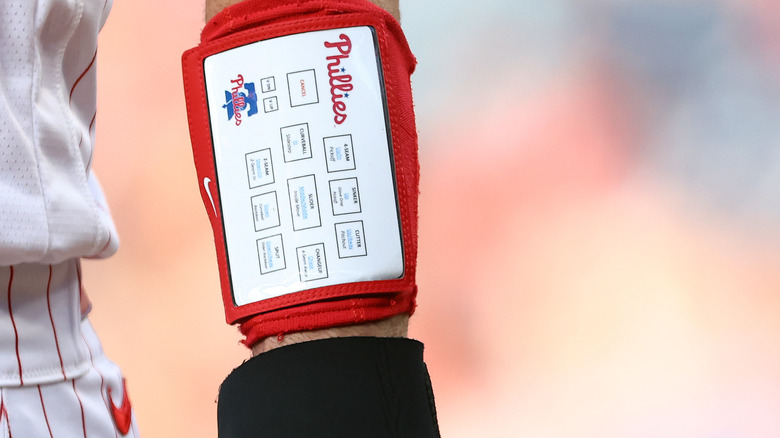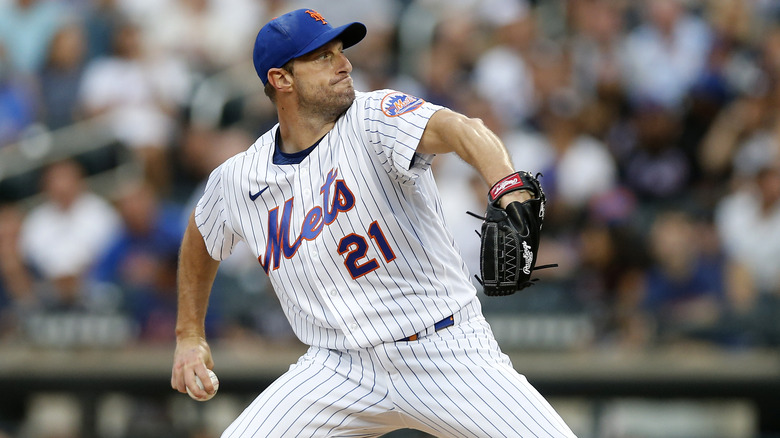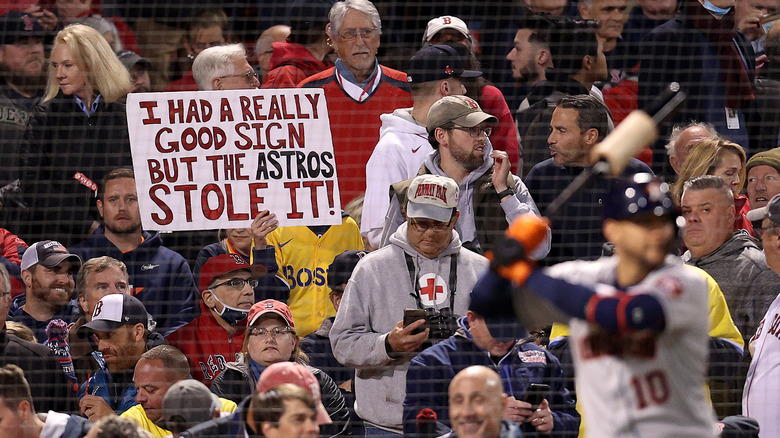The New Baseball Technology That Pros Already Want Banned
Technology has a habit of imposing itself on sports. In some cases — like with the introduction of video referees — it can make the game fairer and ease the burden on officials. In others, it can suck some of the fun out of the game, slow down play, or remove an aspect that both players and fans see as part of the game's required skillset. That could be the case with PitchCom, a new piece of communication tech that has made its way into baseball. Although it may make a pitcher's life easier, some players benefiting from the system are calling for it to be banned, claiming it takes away an important part of the game.
The practice known as sign stealing, while not 100% above board, has long been an accepted part of the game. While not being seen as fair and honorable, it isn't considered cheating either. Catchers, coaches, and pitchers all use pre-arranged signals or signs to relay information to each other. This can give a pitcher a clue about what ball they should be throwing, and can also give the opposition the same information — provided they crack the code (via Baseball Scouter).
Usually, it's the player on second base who interprets the signs and then makes the batter aware of what to expect with a few signs of their own. Batters have been known to look around at the catcher and try to pick up the information on their own, though doing this might come with a penalty. Pitchers have been known to punish perceived infractions through the use of bean balls — that is, a ball hurled deliberately at a batter's head or body. Teams often have a backup set of signs that they can switch to if they believe the main set has been decoded.
PitchCom makes sign stealing incredibly difficult
Earlier this year, MLB announced that PitchCom, a piece of tech that makes sign stealing pretty much impossible, has been approved for use during the 2022 regular season. The tech inhibits sign stealing by simply removing signs from the equation. Instead of complex and subtle hand signals, a catcher will be able to communicate with the pitcher through a pad worn on the gloved hand. Buttons on the pad can be used to signal what type of ball the pitcher should be throwing, and the message is then relayed to the man on the mound via an earpiece. PitchCom can also communicate with as many as three other teammates, which could help out with field arrangements.
Using the device is by no means mandatory; the League has just made the technology available to the teams that want to use it. If a side prefers to keep using their fingers, then they have that option, too. There are also concerns the devices could be hacked by less scrupulous teams that are intent on gaining an edge. However, the fact the NFL has used earpiece-based communication devices for years without issue may reassure some of the skeptics. This isn't the first wearable piece of technology the MLB has approved, either. Back in 2017, the governing body approved the use of whoop straps to better track how players' bodies are coping at various stages of the game.
Mets' Max Scherzer is not a fan of the new system
Although it may make their lives easier and their tactics more secure, not everyone is happy about the sport's governing body giving PitchCom the green light. After using it for the first time, New York Mets pitcher Max Scherzer believes the device should be illegal, and that sign stealing — and counteracting it — are skills that should not be removed from the game.
Speaking to Newsday Sports, Scherzer said: "Here's what I'll say on PitchCom. It works. Does it help? Yes, but I also think it should be illegal. I don't think it should be in the game. Stealing signs is part of the game. For me, I've always taken pride in having a complex system of signs and having that advantage over other pitchers. The fact that we're taking this out of the game and we're putting in technology, now you can't steal signs on second, the pitcher can't have an advantage of having a complex system. It's part of baseball, trying to crack someone's signs."
Whether Scherzer will get his way and the MLB will roll back its decision remains to be seen. It's also worth noting that his views aren't unanimously held, even amongst New York-based pitchers. Luis Severino of the New York Yankees praised PitchCom after using it in a pre-season game. He said, "I was a little doubtful at the beginning, but when we started using it, it was really good — with a man on second, too. I would definitely like to use it in my first start. You know what pitch you're going to throw right away."
This isn't the first tech-related sign stealing controversy
While the man on second base deciphering signs and relaying them to the batter isn't considered cheating, teams have taken things too far. The Houston Astros won the 2017 World Series after an elaborate sign-stealing scheme paid off. An investigation showed the Astros were using part of the video replay system all baseball grounds have to assist with call challenges to steal signs. The signs were initially relayed from the control room itself, but the Astros eventually had a television with the correct feed installed near the dugout. Runners were also used to relay information to the batter, but the dugout eventually ended up banging on a trash can to alert the batter to a potential curveball (via the New York Times).
When the scheme eventually came to light, the backlash was significant. Fans and opposing players were quite open in their disgust at the underhanded tactics used by the Astros. The League also imposed a number of penalties, though many believe the punishments did not go far enough. The team did not vacate — nor was it stripped of — its controversial World Series win. They were fined $5 million, and numerous suspensions were handed out to the coaching staff involved. The players, who co-operated with the investigation in exchange for immunity, were spared any sanctions. While using technology to prevent sign stealing may have divided opinions, using cameras to steal signs is universally condemned.



